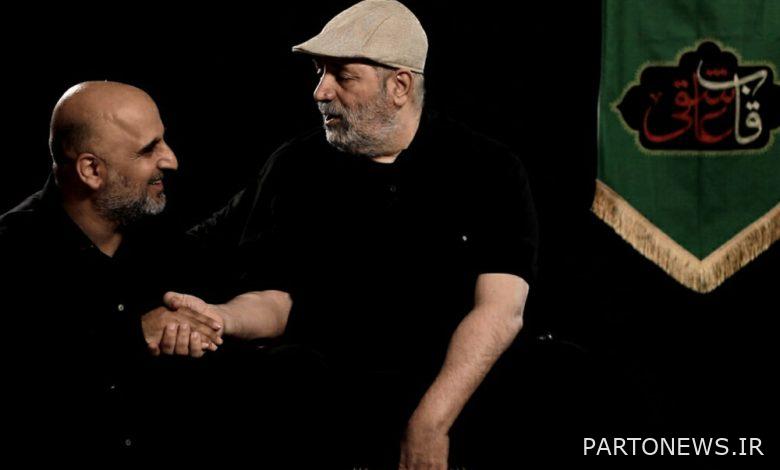“Love frame” is a show of cinema’s tribute to Ashura / I asked the unsaid – Mehr News Agency | Iran and world’s news

Masoud Najafi, the producer and director of the “Qab Ashaghi” program, which has been airing every night since the first night of Muharram on Nasim, told Mehr reporter about the idea of this program: “Iranian cinema has always been concerned with various occasions due to its tasteful cinematographers.” Ashura and dealing with the various themes and elements of this trend-setting event, whether directly or indirectly, is considered one of the most important and serious ritual and religious occasions that Iranian cinema has dealt with in various ways.
He continued: Muharram 2017, when I was in the public relations of the cinema organization, we decided instead of wearing black, which is common these days, by extracting films related to the Ashura uprising and placing each of them in an inscription, an exhibition titled “Cinema and Establish Muharram” which was welcomed and is still being repeated.
The director of “Qab Ashaghi” said: this year, this idea was presented to Nasim network in a visual form four days before the month of Muharram, and with the support of this network’s program, it was shown every night in 30 minutes to one of the related films, either directly or otherwise. Imam Hussain (a.s.) has paid directly and directly, let’s pay.
He mentioned films such as “Because of Haniyeh”, “Heartbroken”, “Maseb Doshize”, “Me and Zeba”, “Hihat”, “Karbala Geography of One History”, “The 10th Night” and “Flying in the Night” which On the first night of this program, they have been addressed and he continued: On the occasion of the 40th anniversary of the making of the movie “Safir”, we discussed this enduring work of Ashurai in two parts, and the producer of this film, Seyyed Hassan Jalair, appeared in front of the camera for the first time to hear unsaid stories from The construction of this work stated that it was noticed. The story of the making of “Event Day”, another Ashurai movie, was narrated in two parts.
Najafi considered “Nasur” and “Dakhil” to be the central films of the program in the coming nights and said: For each film, in addition to the introduction, we will sit down to the talks of the producer and director of the film about the Ashura parts of that film. Ali Rouyin Tan, Mohsen Ali Akbari, Javad Norouz Beigi, Masoud Atyabi, Mohammad Reza Shafiei, Hadi Naiji, Dariush Yari, Amir Hossein Sharifi, Jamal Shurjah, Abdullah Esfandiari, Farid Sajjadi Hosseini, Kianoosh and Dariush Dalvand are the people who have been in front of the camera of this program.
Referring to the last part of the program on Friday, August 21, he continued: In the last night, with the presence of film critic Amir Reza Mafi, he made a general assessment of Ashurai works and other films such as “Empty Hands”, “Need”, “White Wings” and We will pay in the evening of the tenth day.

Najafi said about the feedback of this program, especially in the virtual space: Fortunately, the work has received a lot of feedback and has been noticed. Especially the parts whose design was from the creator of the new work were seen more. As someone whose main profession was a journalist, I tried to ask about things that are less discussed and more attention. Media friends were kind as always and paid attention to “Love frame”.
The director of “Qab Ashaghi” continued: I tried to hear the narration of the production of these works from the director and producer as the main owners of the film, and even for “The Ambassador”, who was the first time the producer of the film, Hassan Jalaiir, was convinced to talk about the film, the voice of the deceased We also heard the director Fariborz Saleh whom I had interviewed many years ago. Or, for “The 10th Night”, I tried to have Jamal Shurjeh in the show despite his illness, which was possible with the cooperation of his son. For the film “Flight in the Night”, in addition to the presence of Mohsen Ali Akbari as a substitute for the production of the film, we obtained and used parts of the video conversation of Rasool Malaqlipour through film critic Akbar Naboi. The only film where the director and producer were not present in the program was “The Day of the Event” for which Shahram Asadi apologized for some reasons, Morteza Shaiste was in the hospital at the time, and went to Abdullah Esfandiari, the cultural assistant at the time of Farabi, who was involved in the creation of the work, and also Farid Sajjadi Hosseini, the first assistant director, we went and heard their story.

Najafi also spoke about the difficulties of producing this program and the challenges that existed: I mentioned before that it took four days from zero to one hundred pre-production to the broadcast of the first episode, and we worked on the production of the program almost around the clock. Especially coordinating the talks and emphasizing the presence of the main people took a lot of energy from us, which went well and was done with the help of Imam Hussain (AS). The management of the Nasim network and the broadcasting and supply of the program of this network were also a good company with me, and almost every episode was sent and quickly reviewed and finalized hours before the broadcast.
“Qab Ashaghi” airs every night at 23:30 on Nasim network and is repeated the next day at 2:30, 7:30, 12:00 and 17:30.
In addition to Masoud Najafi as a producer and director, Hassan Handi as a cinematographer, Mohammad Hossein Lavasani as a writer, Kimia Saadat as an editor, Majid Habibi as a text narrator, Ali Shakuri as a graphic designer, and Bashir Jafarinia as a production manager collaborate with this program.

